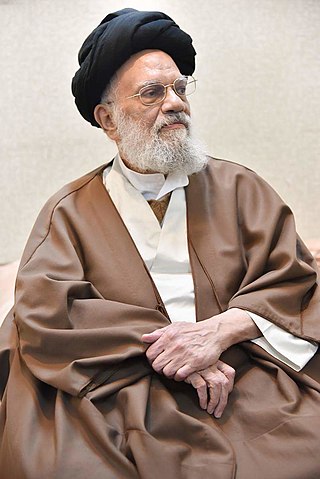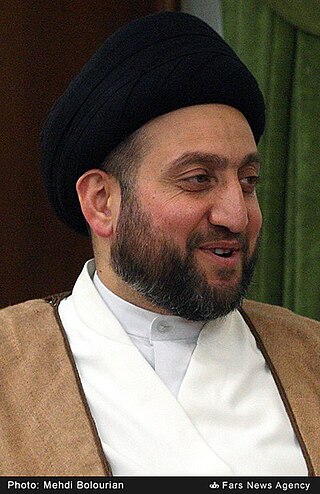Related Research Articles

Ayatollah al-Sayyid Muhammad Baqir Muhsin al-Hakim at-Tabataba'i, also known as Shaheed al-Mehraab, was a senior Iraqi Shia Islamic Scholar and the leader of the Supreme Council for Islamic Revolution in Iraq (SCIRI). Al-Hakim spent more than 20 years in exile in Iran and returned to Iraq on 12 May 2003 following the US-led invasion. Al-Hakim was a contemporary of Ayatollah Khomeini, and The Guardian compared the two in terms of their times in exile and their support in their respective homelands. After his return to Iraq, al-Hakim's life was in danger because of his work to encourage Shiite resistance to Saddam Hussein and from a rivalry with Muqtada al-Sadr, the son of the late Ayatollah Mohammed Sadeq al-Sadr, who had himself been assassinated in Najaf in 1999. Al-Hakim was assassinated in a massive car-bomb explosion in his hometown Najaf in 2003 when he emerged from the shrine of Imam Ali. He was 63. At least 75 others were also killed in the bombing.

Ayatollah Abdul Aziz al-Hakim was an Iraqi theologian, politician and the leader of Islamic Supreme Council of Iraq, a party that has approximately 5% support in the Iraqi Council of Representatives. He also served as the President of the Governing Council of Iraq

Ali al-Husayni al-Sistani is an Iranian-Iraqi Islamic scholar. One of the most senior scholars of Twelver Shia with the rank of Grand Ayatollah and marja', he has been described as the spiritual leader of Shia Muslims worldwide, "the undisputed leader of Iraq's Shias", included in top positions of "The Muslim 500: The World's Most Influential Muslims", from 2009 to 2024, and named one of the 100 most influential people in the world by Time magazine in 2004 and 2005.

Grand Ayatollah Kadhim Husayni al-Haeri is a prominent Twelver Shi'a Marja. He has studied in seminars of Najaf, Iraq under Grand Ayatollah Sadeq al-Sadr. Haeri was born in Karbala, Iraq. He was a top leader of the Al-Da'wa Party in Iraq. His involvement in the party led to his exile in the 1970s, later he moved to Iran, where he remains to this day in the city of Qom.

Grand Ayatollah Sayyid Abu al-Qasim al-Musawi al-Khoei was an Iranian-Iraqi Shia marja'. Al-Khoei is considered one of the most influential twelver scholars.

Grand Ayatollah Sayyid Hossein Ali Tabatabaei Borujerdi was a leading Iranian Shia Marja' in Iran from approximately 1947 to his death in 1961.

Grand Ayatollah Sayyid Muhammad-Saeed al-Tabataba'i al-Hakim was an Iraqi senior Shi'a marja, and one of the most senior Shia clerics in Iraq.

Grand Ayatollah Sayyid Muhammad-Sadiq al-Sadr was a prominent Iraqi Shia marja'. He called for government reform and the release of detained Shia leaders. The growth of his popularity, often referred to as the followers of the Vocal Hawza, also put him in competition with other Shi'a leaders, including Mohammed Baqir al-Hakim who was exiled in Iran.

Sayyid Ammar al-Hakim is an Iraqi cleric and politician who led the Islamic Supreme Council of Iraq (ISCI), from 2009 to 2017. He is currently the head of the National Wisdom Movement which is a political coalition in Iraq that was formed to contest the 2018 general election.
Grand Ayatollah Sayyid Taqi Tabatabaei Qomi was an Iranian Shia marja'. He, along with Ali al-Sistani, and Ali Falsafi, were among the only three people to receive a written statement declaring their ijtihad by grand Ayatollah Abu al-Qasim al-Khoei.
Ayatollah Sayyid Jafar al-Tabatabaei al-Hakim is a high-ranking Shiite jurist in the city of Najaf.
Sayyid Ali al-Hakim is a high-ranking Shiite Ayatollah in Najaf, Iraq.
Ayatollah Sayyid Muhammad-Ali al-Hakim (1911–2011) was a high-ranking Shiite ayatollah. Ayatollah Muhammad al-Hakim was the father of the Grand Ayatollah Mohammad Saeed Al-Hakim.

Ayatollah Sayyid Radhi al-Husayni al-Shirazi, also known as Razi Shirazi, was an Iraqi-Iranian Shia who was a jurist, philosopher and theologian. He was the great-grandson of the renowned Shia jurist, Mirza Shirazi, the pioneer of the Tobacco protest. He was the Imam of the Shifa mosque in Yousefabad.

Ayatollah Sayyid Riyadh al-Tabatabaei al-Hakim is the eldest son of grand Ayatollah, Muhammad Saeed al-Hakim. He is a notable teacher at the Islamic seminary of Qom.

Agha Syed Hamid Ali Shah Moosavi was the patron-in-chief of the supreme Shia ullama board and president of Tehrik-e-Nafaz-e-Fiqah-e-Jafaria, the Shiite-law implementation movement. His family is descended from Imam Musa al Kadhim, the seventh imam of Twelver Shias. Moosavi became president of Tehrik-e-Nafaz-e-Fiqah-e-Jafaria of Pakistan after the death of Mufti Jafar Hussain.
Marja' is a title given to the highest level of Twelver Shia religious cleric, with the authority given by a hawzah to make legal decisions within the confines of Islamic law for followers and clerics below him in rank. The highest ranking marjiʿ is known as the marja al-mutlaq or marja al-taqlid al-mutlaq. A marji' is usually also a grand ayatollah.

The Najaf Seminary, also known as the al-Hawza Al-Ilmiyya, is the oldest and one of the most important Shia seminaries (hawza) in the world. It is located near the Imam Ali Shrine in the city of Najaf in Iraq, and also operates a campus in Karbala, Iraq. It was established by Shaykh al-Tusi, and continued as a center of study after the establishment of modern Iraq in 1921.

Grand Ayatollah Sayyid Abd al-A'la al-Musawi al-Sabziwari was an Iranian-Iraqi Shia marja'. He is regarded as one of the most influential grand religious authorities and he was a contemporary of Abu al-Qasim al-Khoei.
Ayatollah Sheikh Muhammad-Baqir al-Irawani is an Iraqi Shia scholar, religious authority, and poet.
References
- ↑ "Muhammad Baqir al- Hakim". Oxford Reference. Retrieved January 27, 2013.
- ↑ "Who is Muqtada al-Sadr?". CNN. April 6, 2004. Retrieved January 27, 2013.
- ↑ Ayatollah Sistani is Iraq’s Bulwark against Iran: Wikileaks, Informed Comment , 2010-02-12
- ↑ Ayatollah Muhammad Ali al-Hakim Returns to His Lord, Islamic Insights, 2011-03-06